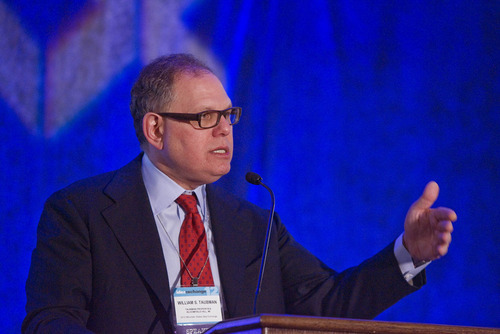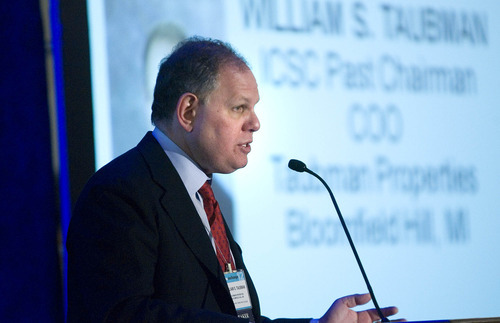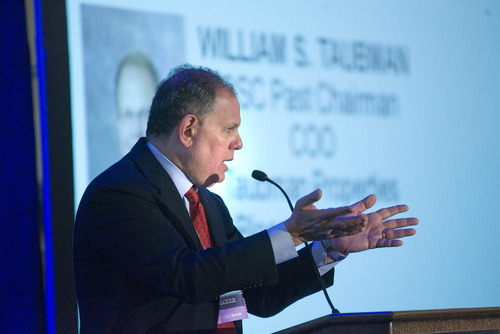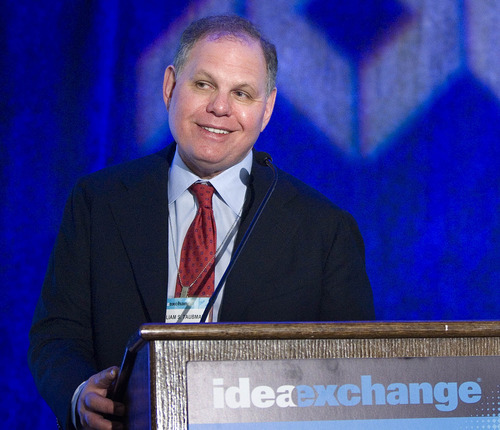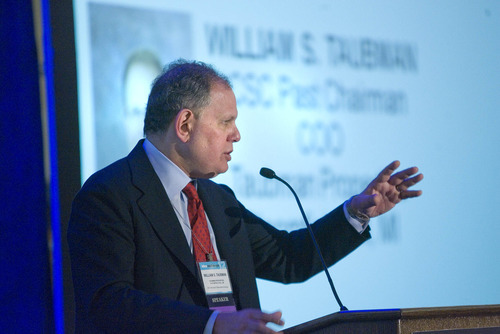This is an archived article that was published on sltrib.com in 2012, and information in the article may be outdated. It is provided only for personal research purposes and may not be reprinted.
The Internet has forced shopping malls to reinvent themselves as entertainment destinations — a design that is much like that of City Creek Center in downtown Salt Lake City, developer William Taubman said Friday.
But more telling in his opinion, e-commerce sales that generate no sales taxes present an unfair advantage over malls, and threaten the future of brick-and-mortar stores.
Taubman, chief operating officer of Taubman Centers Inc., which owns and operates City Creek Center that opened Thursday, spoke Friday in Salt Lake City during the International Council of Shopping Centers, Mountain States Idea Exchange. The global trade association of 50,000 members supports legislation before Congress that would permit states to require retailers to collect taxes from Internet sales.
Online sales and the economic downturn have dramatically slowed mall development across the nation, said Taubman.
Sprawling City Creek will be the only shopping center of its size to open in the United States this year — and the first enclosed regional shopping center to open in the nation in six years, according to the Council of Shopping Centers.
To compete, shopping malls are becoming a mix of traditional and speciality stores, social gathering places and theatrical destinations, he said.
Taubman, whose Michigan-based company oversees 27 U.S. shopping centers, pointed to City Creek as an example.
The 700,000-square-foot City Creek offers shoppers a variety of amenities, including retractable roofs, a 1,200-foot-long re-creation of the city's historic creek, two 18-foot-waterfalls, three fountains, an outdoor fireplace, children's play areas and free wireless Internet access.
"City Creek keeps people entertained and connected, it gives them a sense of place," he said, adding that in a technology-driven world, "shopping centers can no longer rely on great brands to be competitive."
But there is more to the City Creek story, he said. Taubman noted that his company began consulting nearly a decade ago with representatives of The Church of Jesus Christ of Latter-day Saints, who were facing the issue of a downtown deteriorating just outside the faith's world headquarters.
"The church was facing a tough situation," he said. "Their intentions were to improve the downtown and stabilize and upgrade [properties] outside their front door. [City Creek] did not start out as a radical solution."
But the old ZCMI and Crossroads malls that occupied space where the City Creek now sits "were badly designed," and it became clear that both had to be demolished. The solution that ensued was the broader City Creek development, which includes City Creek Center and offices, condos and apartments. The project was built by the development arm of the LDS Church.
City Creek Center was designed to drive foot traffic from one end of the two-block-long, 23-acre mall to the other.
Nationally, although other regional malls are being planned, Taubman stressed the importance of "creating a level playing field" by allowing states to collect taxes frome-commerce sales. It is estimated that uncollected sales taxes from Internet transactions nationwide will total $23 billion this year alone. E-commerce retailers oppose the tax because of, among other issues, the difficulty they see in collecting such a tax in multiple jurisdictions.
Chris Hatch, government relations chair for the Council of Shopping Centers' Mountain West region, said the battle over sales taxes began with mail-order catalog sales. Because the issue involves interstate commerce "the problem can be fixed only on the federal level." The Utah Legislature passed a resolution this past session urging Congress to take action.
Russell Packer, a broker with Marcus & Millichap Real Estate Investment Services, said Internet sales will increase even more dramatically over then next decade, "making the playing field even less fair than it is today."
dawn@sltrib.comTwitter@DawnHouseTrib —
Sales taxes: Internet retailers vs. retail stores
Growth • Online sales were up 16.1 percent last year, while brick-and-mortar sales grew 4.7 percent.
Utah • Uncollected sales taxes from e-commerce sales for 2012 are estimated at $88.5 million
Neighbor • Idaho's uncollected sales tax is estimated at $46.4 million.
Nationwide • Uncollected sales taxes from online sales estimated at $23 billion this year.
Legislation • Marketplace Equity Act, Marketplace Fairness Act would permit sales taxes on Internet sales.
Source • U.S. Census Bureau; Center for Business and Economic Research, University of Tennessee —
City Creek Center's opening-day numbers
Michael Kors • Sold 100 purses by 3 p.m.
Chick-fil-A • Served more than 4,000 meals.
Godiva Chocolatier • Sold 1,000 pieces of chocolate.
Cheesecake Factory • Sold 1,000 slices of cheesecake
Tiffany & Co • Sold several engagement rings and yellow diamonds.
Bebe and 77kids by American Eagle • Hit sales goal for the day within one hour of opening.
Mall greeters • Handed out about 100,000 store directories.


